|
Getting your Trinity Audio player ready...
|
Reading Time 8 mins
July 9, 2021
Happy Birthday, Slinger Francisco, aka Mighty Sparrow! On this, his 86th birthday, Big Drum Nation is pleased to republish Winthrop R. Holder’s Reflections on “Soca Anthology: Dr. Bird- – The Mighty Sparrow.”
– BDN Editors
“That little poowatee man… A little piss’n tail, man.” Jean in Tony Hall’s Jean and Dinah: A Lordstreet Lime
“… they fighting for progress to stop.” Mighty Sparrow
“The year introduced a calypsonian who was destined to be the most popular for most of the rest of the century. His contribution in 1956 made an impact that no calypso before or after had ever done,” writes Michael Anthony, in the definitive The Carnivals of Trinidad and Tobago: From Inception to the Year 2000, about the most revolutionary calypso year.
Revealing a name that shines through Caribbean history, Anthony continues, “The singer was, of course, the Mighty Sparrow, whose real name is Slinger Francisco. His calypso of 1956, which won him the crown, and which has captivated so many people of so many generations, was Jean and Dinah… the crowds took to it instantly.”

Despite the sea change evident at the time, the noble Guardian–that bastion of the status quo and opponent of any new revolutionary spirit–boldly asserted in its Carnival Sunday edition that Jean and Dinah would not win the Road March! But, like its agitation against Dr. Eric William’s PNM–with which Sparrow would align–in the elections later that year, in both instances, the Guardian proved to be shamefully wrong. Indeed, as Anthony notes, “Sparrow’s calypso had proved so popular that all steelbands were playing it and everybody was singing it,” even on Sparrow’s 86th Birthday!
Viewed through the critical lens of continuity and change in calypso historiography, it’s evident that, without a doubt, the Mighty Sparrow is the quintessential Caribbean performer. This living legend has weathered many a storm and is even more relevant to our lives today–60-plus years since his arrival in, and subsequent domination of, the Kaiso Kingdom and the sphere of entertainment.
Apart from winning in almost every calypso category Dr. Bird, as he is popularly known, has performed throughout the world–often leaving a calypso marker by samplin’ the host language as in “Mas in Caracas” and “Sixty Million French Men”— from every nook and cranny in the Caribbean to the best performance halls spreading the Gospel of love, toleration, compassion, social justice, and humor through the Calypso. As such, he is the Cultural Ambassador Extraordinaire of the Caribbean.
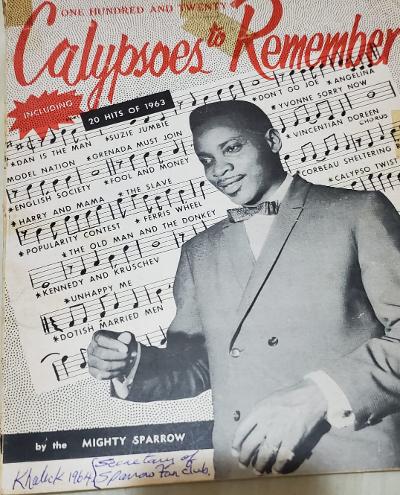
Courtesy Khalick Hewitt, Secretary of The Mighty Sparrow Fan Club, 1964.
Where does one start and end in putting together A Sparrow Anthology? From his vast discography, which calypsos does one include and exclude? But before we explore this or even The Anthropology of Sparrow, it is helpful to revisit Sparrow’s frame of reference.
Does he merely reflect his or society’s sensibilities, especially within the context of what JD Elder referred to as “the male-female conflict in calypso,” or was he operating more as a “perceptual antenna” underscoring an ability to perceive latent public attitudes–even parables— and holding them up for public scrutiny and possible disdain, even when apparent ownership is claimed by, to employ Leroy Clarke’s, Parables of Eye. And, does the risqué in his melody while being sophisticated enough to compel dancing to inhere a subtler form of double entendre– enticing audiences, at their peril, to be flippant about issues around which they shouldn’t?
Writing in 1998 before the Me-Too Movement and heightened sensitivity toward the unequal treatment of women, the venerable Keith Smith observed: “One [song] the general would not have wanted to hear and which Sparrow won’t be caught dead singing today, since the girl is under age’, after all, would be: ‘Thirteen-year-old Mabel/She looking for trouble…Don’t worry your head over me/Study yourself and not for me/Because ah young and strong/I ain’t fraid a man in town/Don’t worry yuh head over me.’” Yet, in “Mabel,” by inverting the thrust of his classic “Gunslingers” and skillfully putting words in the accent of a female–an under-age one to boot–is Sparrow celebrating machismo/conquest–of a female or male form–or is he assaulting our sense of decency in order perhaps to re-fashion and compel a higher ethic?
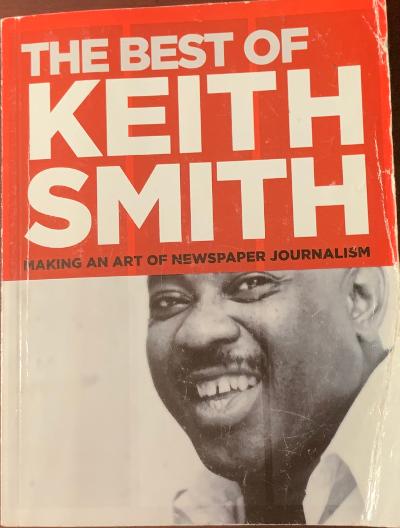
To be sure, “Mabel” didn’t make the Anthology. Still, one wonders if Sparrow and the writers with whom he collaborated, rather than revealing the personal weren’t, like James Joyce in Ulysses, telling societal tales in a new way based on “record[ing] incident[s] encountered and speech heard with photographic accuracy” to incite a more searing look at self and social (mal)practices. As such, Sparrow presages Shadow’s “Through the Mirror,” where “the dummy in the mirror is an alien/ a being from another dimension” around whose music one should tread lightly as one may be dancing to narratives and behaviors which should be erased?
However, with this compilation, THE MIGHTY SPARROW – SOCA ANTHOLOGY: DR. BIRD, VP Records presents us with a masterful kaleidoscope of thirty of Dr. Bird’s evergreen songs. These timeless classics focus on Sparrow’s distinctive music, voice, and versatility anew as he explores and continually expands the timbre and range of our experience through the instrumentality of calypso. This is reflected in the hauntingly melodic and tender tabanca-ish love song Maria, in which he croons,
“I like the way you walk, Marie/And I like the way you talk, Marie.
I like the way you smile Marie/, And you have me going wild Marie.“
One wonders if more tender words can be found in calypso lore.
Then in the combative “Ten to One,” he employs his voice to project the rumble and tumble of a street brawl. Indeed, after listening to “Ten to One,” in which one hears “potow pow and the crowd start to scatter,” leaving the source of the shot ambiguous, one can only wonder if it came from one of his Gunslingers. Indeed, today especially in light of the banality of evil that threatens our return to, perhaps in a Naipaulian sense, “the bush,” few then and especially now, would fault Sparrow for using calypso as a weapon of self-defense, redemption, and court defense.
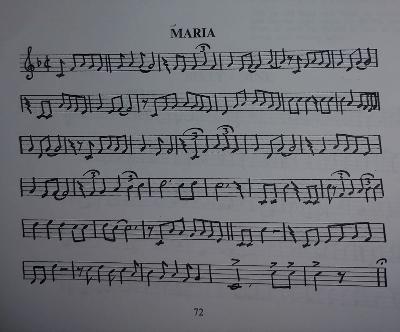
From One Hundred and Twenty Calypsoes to Remember by The Mighty Sparrow
Except for the masterful and politically charged “Dead or Alive,” this compilation samples Sparrow’s deceptively simple but powerfully laced wide range of social narratives which focus on village life as we know it. In this compilation, “Dead or Alive” may have been included to underscore his multidimensionality and internationalism, for indeed, his local themes also speak to and open a window on the universal condition.
Perhaps the unarticulated theme of this Anthology, then, is its dramatization of Sparrow’s fascination with, and understanding of, ‘the story of life.’ In his more youthful days, he was known for his macho stance as captured in “Benwood Dick,” “Mae Mae,” “Village Ram,” in which the narrator boasts:
“Not a woman ever complain yet wid me.
Ah, aint boasting but ah got durability
And if a woman ever tell you that
I leave she dissatisfy
She lie, she lie/ I say she lie.”
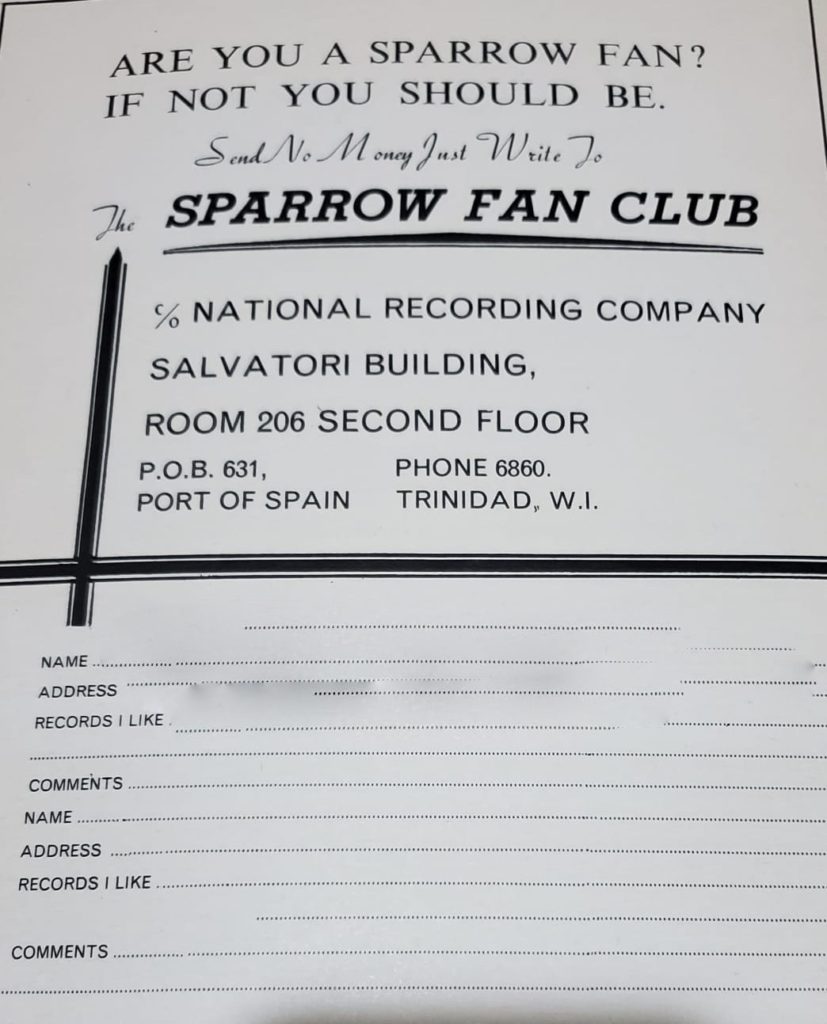
From Sparrow’s 1964 collection “Calypsoes to Remember,” courtesy Khalick Hewitt.
And though in a host of other calypsos Sparrow, the narrator celebrates–instead flaunts–machismo, he ponders the flip side. Thus, in later life in “Willie Dead,” Dr. Bird parodies maleness and ‘the aging system’ much as the indomitable Shadow confronts the disappearance of youthfulness in his classic, “Scratch Meh Back,” in which “old age has no remedy.” Indeed, as a female friend observed, “Too much Saltfish may have killed Willie!”
Indeed Sparrow-the great humanist and satirist–has never been coy about parodying the “Mother-in-Law,” “Obeah Wedding” and the entire range of human emotions, including death as in “Willie Dead” and “Sparrow Dead”–in which the great bard makes one wonder if these takes are opposites or equivalent–tunes that are memorialized in this collection.
Another stellar entry in the Anthology is the song with which we opened, “Jean and Dinah,” perhaps the most discussed calypso of all time: thesis, book chapters, newspaper articles, even kaiso critiques have engaged it critically and otherwise. But maybe the most inventive take on it is Trevor Hall’s play of the same name.
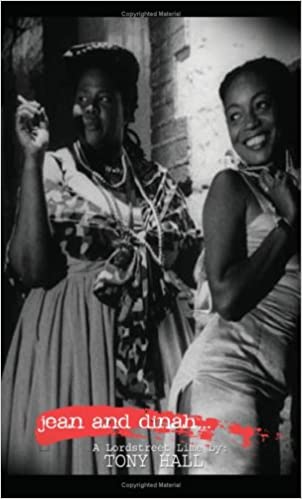
In Hall’s drama, he releases Jean and Dinah from Merle Hodge’s terms, operating “under the shadow of the whip,” thus unsilencing them to tell their long-suppressed stories. And, what rollicking and heartfelt stories they tell as teased out in the epigraph! New life was given to this Sparrow classic by transforming the theatrical into theatre, assuring it another notch in the annals of calypso lore and performance art.
Perhaps the most noteworthy omission from the Anthology is the defiant and illustrious in terms of outlining a calypso pedagogy, “Robbery With V,” which speaks poignantly for itself:
They want a new king; they will do anything
They want a new king; they will do anything
Well, they don’t like meh way how I sticking out for money,
If I don’t get paid, I aint singing for nobody
They decide to clip me wing and put an obstacle there as king.
Chorus
A man with no originality, no stage personality they trying to make me look small
All he have is a deep croon, but he won’t change the tune at all
This song, that song, same melody, no variety
If you don’t believe me, you can ask anybody if it aint Robbery with V
Hiding the judges’ name, ah fus they feeling shame,
They feel they spiting me, but they too blind to see,
I am the only man does fight for calypsonians.
Right here on this island getting no appreciation
Instead of helping me up, they fighting for progress to stop.
Chorus
….
Now try and remember, I have nothing against Dougla,
We all went up to sing, and all of we hope was to win
It is the committee that making it they duty, forgetting ability, extending sympathy
But is one thing they learn; they give him the crown, but I have the throne.
Chorus
They say I am not a sport, call me names of every sort.
But I want them to know; MY WHOLE LIFE IS CALYPSO.
I take it seriously. I ain’t care who say I silly,
It’s a job to me; no one should disagree…
Indeed, Sparrow’s last verse above may well be the flip side of Dr. Eric Williams’s “I am going to let down my bucket where I am, right here with you in the British West Indies.” It was as if in “Robbery With V,” Sparrow, too, was letting down his bucket in the wider West Indies but with calypso as his métier. Interestingly, Sparrow’s commitment to fighting the enemies of progress didn’t stop at the judges’ scoresheet but, in later years, extended to the very PNM (“We Like It So”), which he had embraced in the 1950s. Little wonder that Gordon Rohlehr, the dean of calypso studies, seized upon “My Whole Life is Calypso” to title his encyclopedic collection, which interrogates the Genius of Sparrow.

Notwithstanding the minor omission, Dr. Bird is a must-have Anthology. It also includes the classic “Lying Excuses”–which sings through the ages–and a DVD with some stellar Sparrow performances and a few stalwarts of the entertainment industry, such as the impresario Holly Betaudier, ace band leader Roy Cape, and Winston “Gypsy” Peters, reflecting on the rise and enduring legacy of Dr. Slinger Franscisco. This helps one better appreciate Dr. Bird’s journey: From the Grenadian well from which he sprung to finding his voice and groove in cosmopolitan Trinidad and Tobago, and, now, to Queens, NY, where he resides in his senior years. This (2011) collectors’ item captures and preserves the reign of one of, if not the foremost Caribbean artist of the twentieth century: Slinger Francisco!
Profound thanks to Steve Clarke for opening up his archive and providing the images.
Tags: #caribbean #soca #calypso #carnival #trinidad #caribbeanlife #trinidadandtobago #westindies #westindianculture #trinidadcarnival #caribbeanculture #grenada #culture #calypsoasteachingtool #carnival history #caribbeanhistory #calypsohistory
W. R. (troppy) Holder, an emancipated NYC public educator and a founding member of the Caribbean Awareness Committee (NY), is co-editor of BigDrumNation and the author Classroom Calypso: Giving Voice to the Voiceless.

Troppy, great description of our national Griot. As the Berdie would say: You not joking at all. I think you should continue this dialogue. Afterall, Sparrow represented our good, bad and ugly in the various aspects of our then colony and post colony behavior and culture. Thanks.
Eye opening about the breadth and depth of Sparrow, much that I wasn’t fully aware of! What an oeuvre! Sparrow should have been a contender for the Nobel Prize in Literature the same way Bob Dylan won the prize a couple years ago. I don’t remember the exact words they used to describe Dylan’s achievement but the same can be stated for Sparrow as the voice of generations.
This is so well written. So much in this short narrative yet it has still left me yearning for more.
I look forward to many more excellent pieces.
Well written you have surpassed a fellow Alumnus and family member as the the literary giant of the Holders.I was worried that you were not going to mention my favourite Lying Excuses. Ms O would be proud. Well done.